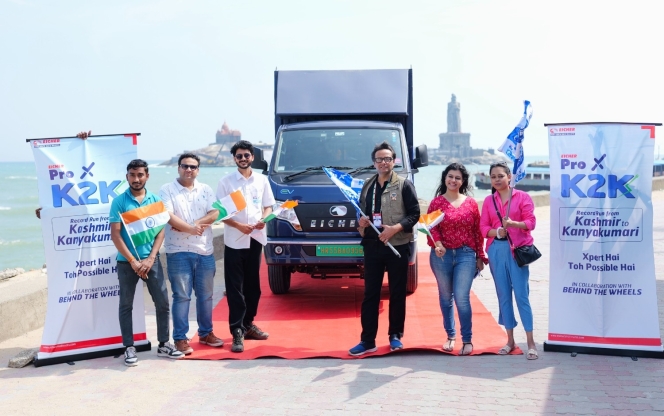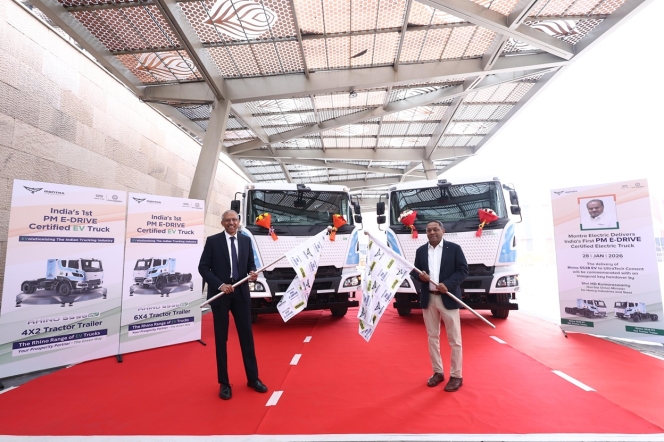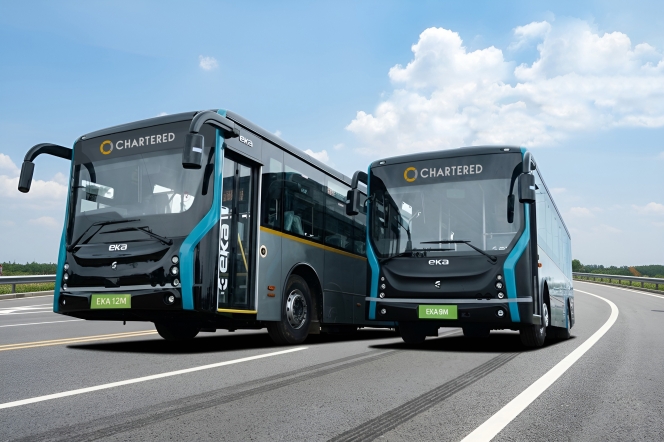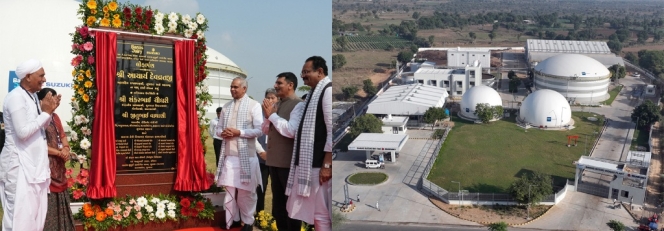Electric Vehicles: Driving India's Last Mile Connectivity for Economic Growth
- By Dr. Darshan Rana, Chairman & MD, Rana Group
- August 08, 2023

“Rural India is the real India,” this statement holds a profound truth. While urban centres may dominate the narrative of progress and development, it is in rural India where the heart and soul of the nation reside. But for any country to progress, connectivity with rural regions, especially the last mile connectivity is an absolute must. And electric vehicles are driving India’s last mile connectivity and contributing to the nation’s economic growth.
There is no debate that EVs offer a viable alternative, bringing numerous benefits such as reduced emissions, lower operational costs, and improved energy efficiency. Through this article I would like to highlight six critical factors which will contribute to EVs becoming the driving force in India’s last mile connectivity.
Cost of Ownership- a strong ruling factor:
One significant advantage of EVs is their lower cost of ownership compared to traditional internal combustion engine (ICE) vehicles. While the initial purchase price of EVs may be higher, the operational and maintenance costs are considerably lower. EVs have fewer moving parts and require less frequent servicing, resulting in reduced maintenance expenses. Moreover, the cost of charging an EV is substantially lower than the price of fossil fuels, contributing to long-term savings. As EV technology continues to advance, economies of scale and improved battery technology are expected to further drive down the cost of ownership, making EVs an attractive choice for last mile connectivity in India.
The world of E-commerce- Driving EV adoption in full scale:
It is estimated that the B2C e-commerce market in India is expected to reach $ 107.3 billion in 2023. The exponential growth of e-commerce in India has heightened the demand for efficient last mile connectivity solutions. With the surge in online shopping, delivery vehicles have become a ubiquitous presence in urban areas. Recognizing the need for sustainable transportation options, e-commerce companies are increasingly adopting EVs for their logistics operations. This trend not only promotes eco-friendly practices but also contributes to the wider adoption of EVs by raising awareness and creating a market for electric commercial vehicles. The symbiotic relationship between e-commerce and EVs presents a significant opportunity to accelerate the transition to clean and efficient mobility in India.
Government Policies – Creating impactful solutions:
The Indian government has been instrumental in driving the adoption of EVs through various policy measures. Since 2011 when the GOI formed the National Council for Electric Mobility who was tasked to make recommendations to promote e-mobility & manufacturing of EVs, initiatives such as FAMEscheme provide financial incentives and subsidies to both manufacturers and consumers, making EVs more affordable. The government has also implemented ambitious targets for EV adoption and aims to electrify a significant portion of the public transportation system. Additionally, favourable policies, such as exemption from certain taxes and tolls, encourage individuals and organizations to embrace EVs.
OEM Impact on EV ecosystem- a critical role:
Original Equipment Manufacturers (OEMs) play a pivotal role in shaping the EV ecosystem in India. Several automotive companies have entered the EV market, offering a diverse range of electric vehicles to cater to different segments and requirements. OEMs are investing in research and development to improve battery technology, enhance vehicle performance, and extend the driving range. Furthermore, collaborations with battery manufacturers and charging infrastructure providers are essential to ensure seamless integration and sustainable growth of the EV ecosystem. The competitive landscape is driving innovation, affordability, and improved consumer choices, further bolstering India's last mile connectivity through EVs.
Public & Private sector collaborations- a symbiotic relationship:
The metro rail connectivity is considered to be one of the finest examples of a healthy PPP project in India. In the same lines, the successful transition to electric mobility requires collaborations between the public and private sectors. Public entities, such as municipal corporations and transportation authorities, can facilitate the deployment of EV charging infrastructure and provide incentives for fleet electrification. Partnerships between EV manufacturers, utility companies, and charging infrastructure providers are vital to establishing a robust charging network across the country. Furthermore, knowledge-sharing platforms, industry associations, and research institutions can foster collaboration and exchange best practices to overcome challenges and expedite EV adoption.
Tracking and Analysis of EV Adoption – the role of data:
To ensure the successful implementation of EVs in India's last mile connectivity, tracking and analysis of EV adoption are crucial. Data-driven insights on charging patterns, driving habits, and infrastructure requirements enable stakeholders to make informed decisions and identify barriers and opportunities, refine policies, and allocate resources effectively. Real-time monitoring of charging stations and vehicle performance ensures reliable operation and user satisfaction. Additionally, comprehensive analysis can facilitate targeted interventions, such as incentives for specific regions or sectors, and inform future infrastructure planning. Continuous tracking and analysis contribute to an efficient and optimized EV ecosystem.
A region's mobility is influenced by three key factors: people, infrastructure, and sustainability. These elements determine how well transportation functions within the city. Understanding the needs and behaviors of residents is crucial in designing effective transportation systems, because this in turn will impact the economic development of the region. Infrastructure, including roads, public transit, and pedestrian walkways, plays a vital role in facilitating smooth movement. Importantly, prioritizing sustainable options like electric vehicles and promoting active transportation helps create a greener and more efficient urban environment, with focus on last mile connectivity.
- Eicher Trucks and Buses
- VE Commercial Vehicles
- VECV
- India Book of Records
- IBR
- Eicher Pro X
- Vinod Aggarwal
- SS Gill
- Abhishek Chaudhary
Eicher Pro X EV Completes Kashmir To Kanyakumari Journey In 6 Days
- By MT Bureau
- January 28, 2026

Eicher Trucks and Buses, part of VE Commercial Vehicles (VECV), has completed a journey from Kashmir to Kanyakumari using its Eicher Pro X EV.
The record verified by the India Book of Records (IBR), saw the electric vehicle cover over 4,000 kilometres in 6 days under loaded conditions. The run commenced in Srinagar on 20 January 2026 and concluded in Kanyakumari on 26 January 2026, traversing the Himalayas, plains and the Deccan Plateau.
Throughout the expedition, the vehicle utilised public chargers located via the MyEicher App. An adjudicator from the India Book of Records accompanied the truck to monitor route compliance, load, distance and charging stops. The mission served as a demonstration of electric vehicle endurance across diverse altitudes and climates to validate the technology for logistics corridors.
The journey was intended to show that electric commercial vehicles can operate beyond short-haul deliveries. By maintaining performance across hilly and coastal routes, the Pro X EV aimed to establish total cost of ownership (TCO) benefits and maintenance predictability for fleet operators. The successful completion of the route suggests that current charging infrastructure can support long-haul electric freight movement.
Vinod Aggarwal, MD & CEO, VE Commercial Vehicles, said, “For more than four decades, Eicher trucks and Buses have earned customer trust through leadership in fuel efficiency and application-specific engineering. The record-setting performance of the Eicher Pro X reinforces our unwavering focus on application excellence, reliability, and performance, anchored in robust product development and manufacturing capabilities, and enabled by a customer-centric, pan-India commercial and dealer network. I commend the entire Eicher team for achieving these well-deserved records”.
SS Gill, Chief Commercial Officer, VE Commercial Vehicles, said, “By covering the K2K route with a loaded Pro X EV, Eicher Trucks & Buses has proven that electric mobility is no longer restricted to short-haul, ‘last-mile’ deliveries. We are not just setting records, but through the strength of our service network and extensive dealer set-up, we are demonstrating that our EV technology is commercially viable, reliable, and has the range to serve as the backbone of India’s green logistics corridors”.
Abhishek Chaudhary, SVP – SCV Sales & Marketing, VE Commercial Vehicles, said, “The Eicher Pro X EV was put to the ultimate test – covering over 4000 kilometres across diverse climates and challenging altitudes. With this recognition from the India Book of Records we’ve moved beyond our own stringent testing benchmarks to real-world validation - Demonstrating that Eicher Pro X EV is a dependable partner for logistics movement across varied operations in India”.
- Montra Electric
- Murugappa Group
- PM E-Drive Scheme
- Rhino 5538 EV 6x4 Tractor trailer
- Narendra Modi
- H D Kumaraswamy
- Arun Murguappan
- Sathia Raj
- UltraTech Cement
Montra Electric Becomes First OEM To Receive PM E-Drive Certification For Heavy Trucks
- By MT Bureau
- January 28, 2026

Montra Electric, the electric medium and heavy commercial vehicle business of the Murugappa Group, has become the first manufacturer in India to receive certification for heavy-duty electric trucks under the government's PM E-Drive Scheme.
To mark the achievement, the company delivered a Rhino 5538 EV 6x4 Tractor trailer to UltraTech Cement. The handover took place in the presence of Arun Murugappan, Chairman of Montra Electric and Sathia Raj, Chief Procurement Officer of UltraTech Cement.
The PM E-Drive scheme includes a budget of INR 5 billion specifically for electric trucks, providing a benefit of up to INR 960,000 per vehicle for the Rhino 5538 EV. This incentive is intended to lower operating costs and reduce exposure to fuel price volatility for fleet operators in the logistics, mining, and manufacturing sectors. The Rhino 5538 EV range is designed for Indian conditions and is available in 6x4 and 4x2 variants.
The Rhino 5538 EV 4x2 variant features a 282 kWh LFP battery that produces 380 HP and 2000 Nm of torque. It offers a range of approximately 198 km under standard test conditions and supports six-minute battery swaps. These specifications suit the vehicle for high-utilisation applications in ports, steel plants, and cement logistics.
H D Kumaraswamy, Union Minister for Heavy Industries, said, "The PM E-Drive scheme is a testament to the growing prowess of Indian innovation in the heavy-duty electric vehicle segment. Under the visionary leadership of Prime Minister Narendra Modi, we are committed to decarbonizing our logistics and making India a global hub for EV manufacturing. Electric trucks are pivotal to our Net Zero goals, and by fostering a self-reliant ecosystem through such certifications, we are driving the spirit of Atmanirbhar Viksit Bharat. We are very happy to see our Prime Minister’s vision coming to life with the 1st PM E-Drive certified heavy duty electric truck from 'Montra Electric' getting delivered today."
Arun Murugappan, Chairman, Montra Electric, said: “Decarbonising freight is one of the most critical challenges in India’s energy transition. We are grateful to the Government of India and our Prime Minister Narendra Modi for introducing forward-looking and progressive policy frameworks such as the PM E-Drive Scheme, which represent a welcome and transformative step in accelerating this shift, particularly in heavy commercial vehicles where emissions intensity is high. At Montra Electric, we are proud to contribute to this national mission by delivering technologically advanced, reliable, and scalable electric M&HCV solutions that can drive meaningful and lasting change in India’s mobility ecosystem.”
- Chartered Speed
- EKA Mobility
- PM E-Drive Scheme
- Bengaluru Metropolitan Transport Corporation
- Sanyam Gandhi
- Rohit Srivastava
- electric bus
Chartered Speed And EKA Mobility To Deploy 1,750 Electric Buses In Bengaluru
- By MT Bureau
- January 28, 2026

Chartered Speed and EKA Mobility have received a Letter of Confirmation of Quantity (LOCQ) to deploy 1,750 electric buses in Bengaluru under the PM E-Drive Scheme. This allocation accounts for approximately 39 percent of the city's total planned induction of 4,500 electric buses. The initiative is part of the Bengaluru Metropolitan Transport Corporation effort to expand its network in line with the decarbonisation roadmap of the Government of India.
The partnership combines the operational services of Chartered Speed with the vehicle manufacturing and technology of EKA Mobility. Operational protocols for the fleet include maintenance, battery monitoring, and driver training. Chartered Speed has stated its intention to transition 25 percent of its total fleet to electric power by Fiscal 2027.
The deployment aims to support public transport infrastructure in the region through investments in charging and maintenance facilities. Bengaluru is currently expanding its electric transport capacity to meet state mobility targets. The project focuses on providing urban transport solutions for the city's commuter base while reducing the carbon footprint of the public system.
Sanyam Gandhi, Whole-Time Director, Chartered Speed, said, “Bengaluru is a key mobility hub in India, and electric buses are part of the efforts to build a cleaner and more efficient public transport system. The PM E-Drive allocation strengthens Chartered Speed Limited’s long-term commitment to sustainable mass mobility. As one of the early adopters of e-mobility, we aim to convert around 25% of our fleet to electric by Fiscal 2027, supported by strong infrastructure investments to deliver commuter-centric services aimed at lasting socio-economic impact.”
Rohit Srivastava, Business Head & Chief Growth Officer, EKA Mobility, added, “The PM E-Drive initiative is a powerful enabler of India’s electric mobility vision, and Bengaluru’s large-scale adoption of electric buses sets a strong benchmark for urban transport transformation. At EKA Mobility, we are proud to partner with Chartered Speed and contribute to Bengaluru’s journey towards a more sustainable urban future. It is not just about scale, but about creating cleaner mobility solutions, quieter streets, and a better daily commute for millions.”
Suzuki Opens Second Biogas Plant In Gujarat
- By MT Bureau
- January 20, 2026

Suzuki Motor Corporation and its subsidiary, Suzuki R&D Centre India (SRDI), have inaugurated the Banas Suzuki Biogas Plant in Bhukhala, Gujarat. The facility, which opened on 18 January 2026, is the second such plant following the Agthala site that commenced operations in December 2025.
The plant is designed to process up to 100 tonnes of cow dung per day to produce approximately 1.5 tonnes of biogas. This output is equivalent to the daily fuel requirements of 850 compressed natural gas (CNG) vehicles. In addition to fuel production, the facility will sell organic fertiliser generated as a byproduct of the process.
The project is part of an agreement signed in September 2023 between SRDI, the National Dairy Development Board (NDDB) and Banas Dairy. The partners have agreed to construct a total of five biogas plants in the region. The Bhukhala site covers an area of 27,000 square metres and forms a component of Suzuki’s strategy to support carbon neutrality in India.
The use of biogas serves as a carbon-neutral alternative for CNG vehicles, which currently represent 20 percent of the Indian passenger car market. Beyond emission reductions, the initiative is intended to improve energy self-sufficiency and increase rural income through the purchase of cattle waste from local farmers.
The opening ceremony was attended by Acharya Devvrat, Governor of Gujarat and Shankar Chaudhary, Chairman of Banas Dairy and Speaker of the Gujarat Legislative Assembly. Representing Suzuki was Kenichiro Toyofuku, Managing Officer and Executive General Manager of Biogas Operations.
The company stated that it will continue to develop its biogas business to contribute to national growth and environmental targets. The operation is expected to create jobs within the district while providing fuel for high-demand vehicle segments.







Comments (0)
ADD COMMENT